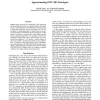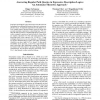119
click to vote
DLOG
2007
15 years 2 months ago
2007
Abstract. Fuzzy Description Logics (f-DLs) have been proposed as formalisms capable of capturing and reasoning about imprecise and vague knowledge. The last years, research in Desc...
126
Voted
AAAI
2007
15 years 2 months ago
2007
Efficient query answering over ontologies is one of the most useful and important services to support Semantic Web applications. Approximation has been identified as a potential...
126
Voted
AAAI
2007
15 years 2 months ago
2007
Expressive Description Logics (DLs) have been advocated as formalisms for modeling the domain of interest in various application areas. An important requirement is the ability to ...
122
Voted
ICDT
2003
ACM
15 years 5 months ago
2003
ACM
Abstract. Repairing a database means bringing the database in accordance with a given set of integrity constraints by applying modifications that are as small as possible. In the ...
108
click to vote
WWW
2010
ACM
15 years 5 months ago
2010
ACM
Typical approaches for querying structured Web Data collect (crawl) and pre-process (index) large amounts of data in a central data repository before allowing for query answering....
104
Voted
FQAS
2004
Springer
15 years 6 months ago
2004
Springer
In: Proceedings of the Sixth International Conference On Flexible Query Answering Systems (FQAS-04), Springer-Verlag LNAI 3055, pp. 203-216. c 2004 by Springer-Verlag. To model qu...
114
Voted
SAC
2006
ACM
15 years 6 months ago
2006
ACM
In this paper, we show that representation and reasoning techniques used in traditional knowledge engineering and the emerging Semantic Web can play an important role for heteroge...
77
Voted
WEBI
2007
Springer
15 years 6 months ago
2007
Springer
In this paper, we propose document-centric query answering, a novel form of query answering for the Semantic Web. We discuss how we have built a knowledge base system to support t...
113
click to vote
ICDT
2007
ACM
15 years 6 months ago
2007
ACM
In this paper, we introduce preferential regular path queries. These are regular path queries whose symbols are annotated with preference weights for “scaling” up or down the i...
123
Voted
GPC
2010
Springer
15 years 7 months ago
2010
Springer
Scalability of reasoning systems is one of the main criteria which will determine the success of Semantic Web systems in the future. The focus of recent work is either on (a) expre...








